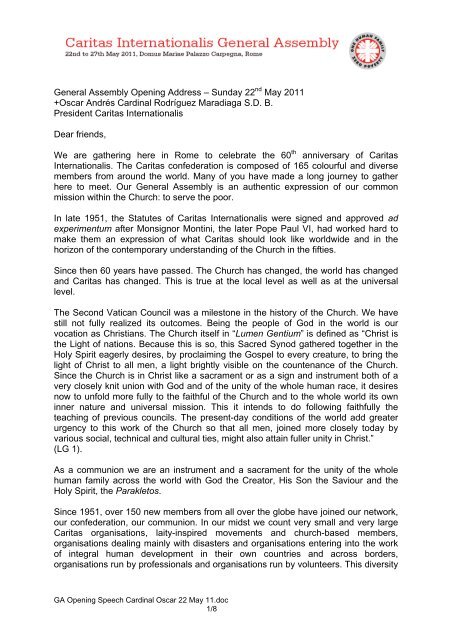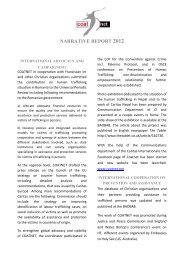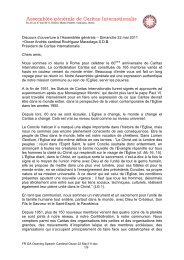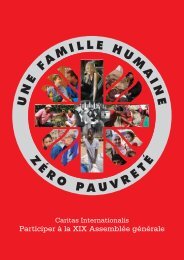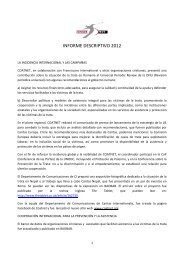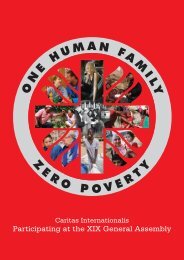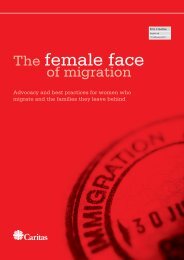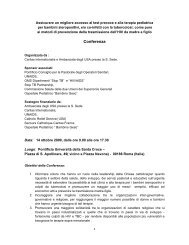General Assembly Opening Address - Caritas Internationalis
General Assembly Opening Address - Caritas Internationalis
General Assembly Opening Address - Caritas Internationalis
You also want an ePaper? Increase the reach of your titles
YUMPU automatically turns print PDFs into web optimized ePapers that Google loves.
<strong>General</strong> <strong>Assembly</strong> <strong>Opening</strong> <strong>Address</strong> – Sunday 22 nd May 2011<br />
+Oscar Andrés Cardinal Rodríguez Maradiaga S.D. B.<br />
President <strong>Caritas</strong> <strong>Internationalis</strong><br />
Dear friends,<br />
We are gathering here in Rome to celebrate the 60 th anniversary of <strong>Caritas</strong><br />
<strong>Internationalis</strong>. The <strong>Caritas</strong> confederation is composed of 165 colourful and diverse<br />
members from around the world. Many of you have made a long journey to gather<br />
here to meet. Our <strong>General</strong> <strong>Assembly</strong> is an authentic expression of our common<br />
mission within the Church: to serve the poor.<br />
In late 1951, the Statutes of <strong>Caritas</strong> <strong>Internationalis</strong> were signed and approved ad<br />
experimentum after Monsignor Montini, the later Pope Paul VI, had worked hard to<br />
make them an expression of what <strong>Caritas</strong> should look like worldwide and in the<br />
horizon of the contemporary understanding of the Church in the fifties.<br />
Since then 60 years have passed. The Church has changed, the world has changed<br />
and <strong>Caritas</strong> has changed. This is true at the local level as well as at the universal<br />
level.<br />
The Second Vatican Council was a milestone in the history of the Church. We have<br />
still not fully realized its outcomes. Being the people of God in the world is our<br />
vocation as Christians. The Church itself in “Lumen Gentium” is defined as “Christ is<br />
the Light of nations. Because this is so, this Sacred Synod gathered together in the<br />
Holy Spirit eagerly desires, by proclaiming the Gospel to every creature, to bring the<br />
light of Christ to all men, a light brightly visible on the countenance of the Church.<br />
Since the Church is in Christ like a sacrament or as a sign and instrument both of a<br />
very closely knit union with God and of the unity of the whole human race, it desires<br />
now to unfold more fully to the faithful of the Church and to the whole world its own<br />
inner nature and universal mission. This it intends to do following faithfully the<br />
teaching of previous councils. The present-day conditions of the world add greater<br />
urgency to this work of the Church so that all men, joined more closely today by<br />
various social, technical and cultural ties, might also attain fuller unity in Christ.”<br />
(LG 1).<br />
As a communion we are an instrument and a sacrament for the unity of the whole<br />
human family across the world with God the Creator, His Son the Saviour and the<br />
Holy Spirit, the Parakletos.<br />
Since 1951, over 150 new members from all over the globe have joined our network,<br />
our confederation, our communion. In our midst we count very small and very large<br />
<strong>Caritas</strong> organisations, laity-inspired movements and church-based members,<br />
organisations dealing mainly with disasters and organisations entering into the work<br />
of integral human development in their own countries and across borders,<br />
organisations run by professionals and organisations run by volunteers. This diversity<br />
GA <strong>Opening</strong> Speech Cardinal Oscar 22 May 11.doc<br />
1/8
in our midst is richness and the fruit of the creative spirit of <strong>Caritas</strong>. There is indeed<br />
not one model for a true <strong>Caritas</strong>, there is nevertheless a call to all the different<br />
organisations and communities to be <strong>Caritas</strong> in Veritate, caritas in the truth.<br />
We are here over the next week to face the challenges of our diversity in union and<br />
communion. I have experienced together with our Secretary <strong>General</strong> Mrs Lesley-<br />
Anne Knight the wealth of our different ways to be <strong>Caritas</strong>. When visiting your<br />
organisations and activities, we were overwhelmed by your will to serve the poor. As<br />
experts in humanity, you transformed disasters into ways out of poverty, you<br />
transformed powerless people into people believing in justice and freedom, you<br />
united people from different faiths and convictions into communions of action in order<br />
to build together His Reign. I am proud of your work and of your being <strong>Caritas</strong>. You<br />
are real witnesses of God’s love in the world. His love is a never-ending source for<br />
renewed creative ways of incarnation in today’s world.<br />
In 2004 <strong>Caritas</strong> <strong>Internationalis</strong> was granted a new juridical status in the Chirographo<br />
“The Last Supper” by Blessed Pope John-Paul II. This changed the legal status of<br />
<strong>Caritas</strong> <strong>Internationalis</strong>. As a “Public Juridical Person” on the level of the universal<br />
Church we take, within the limits of our mandate, part in the “munus docendi” and<br />
even in the “munus regendi” of the Holy Father, when we talk and act “in the name of<br />
the Church”. This second nature complements our historical first nature as a<br />
confederation and it transforms it into a specific body in the Church.<br />
In the framework of our statutory work, to which many of you have participated during<br />
the two big consultation processes, we are now in constructive dialogue with the Holy<br />
See talking about a dual legal and theological nature of <strong>Caritas</strong> <strong>Internationalis</strong>. As<br />
“confederatio sui generis”, we bring together the <strong>Caritas</strong> organisations of the world,<br />
as designed by the local bishops or bishops’ conferences. As a “Public Juridical<br />
Person”, <strong>Caritas</strong> <strong>Internationalis</strong> is an instrument of the Holy Father who is<br />
represented in our midst through the Secretary of State, Cor Unum and the other<br />
dicasteries in charge of charity and justice.<br />
<strong>Caritas</strong> <strong>Internationalis</strong> experiences in this anniversary <strong>General</strong> <strong>Assembly</strong> its full<br />
potential as the worldwide gathering of <strong>Caritas</strong> members in the name of the Church.<br />
For this reason the Secretary of State specifically invited more bishops to attend this<br />
meeting. Today we are more than 50 bishops gathered together with our <strong>Caritas</strong><br />
organisations and linked to all the others represented here through priests, sisters<br />
and lay people. <strong>Caritas</strong> at the local level has already developed over many years this<br />
dual theological and legal nature. Some of our members are part of bishops offices or<br />
conferences; others were constituted as civil society organisations and recognised by<br />
their local Church as such or either as private or public associations of faithful.<br />
Whatever the legal nature of a local <strong>Caritas</strong> might be, there is no doubt about its<br />
ecclesial nature and its tethering to the Church and the bishop.<br />
Presently Cor Unum is preparing a decree to reemphasis the bishops’ responsibility<br />
in their local or national <strong>Caritas</strong>. And we are happy to have so many of our <strong>Caritas</strong><br />
bishops with us, thus helping us to frame the purpose and theology of <strong>Caritas</strong><br />
GA <strong>Opening</strong> Speech Cardinal Oscar 22 May 11.doc<br />
2/8
<strong>Internationalis</strong> as it is actually under discussion. By this, dear brothers in the<br />
Episcopate, you take part on the level of the universal Church. Together we are<br />
implementing what Pope Benedict recalled in his encyclical Deus <strong>Caritas</strong> Est: “In<br />
conformity with the Episcopal structure of the Church, the Bishops, as successors of<br />
the Apostles, are charged with primary responsibility for carrying out in the particular<br />
Churches the programme set forth in the Acts of the Apostles (cf. 2:42-44): today as<br />
in the past, the Church as God's family must be a place where help is given and<br />
received, and at the same time, a place where people are also prepared to serve<br />
those outside her confines who are in need of help.” (DCE 32).<br />
Dear friends, our mission is to serve the poor, and even more the poorest of them<br />
first. This is our raison d’être and thus we are at the heart of the Church’s mission of<br />
diakonia. For many people in need, <strong>Caritas</strong> is the loving face of Christ who brings<br />
relief and comfort, respect and recognition. As <strong>Caritas</strong> we are called to witness His<br />
love and we do it with enthusiasm. We know that God is love and we know and<br />
believe that He has created every single person in his image. Therefore we can’t<br />
afford to lose one single person from our one human family without losing our own<br />
destiny. We would lose a brother or a sister in Christ, who made Himself equal to all<br />
of us. Therefore poverty cannot be accepted in our world. Where poverty is not<br />
chosen, but imposed by unjust structures and decisions, it affects the dignity of our<br />
brothers and sisters who are all in their own right images of God, who we dare to call<br />
“Our Father”.<br />
In the Post-synodal Exhortation Verbum Domini, Pope Benedict XVI synthesises the<br />
ambiguity in the concept of poverty. “The Church also knows that poverty can exist<br />
as a virtue, to be cultivated and chosen freely, as so many saints have done. Poverty<br />
can likewise exist as indigence, often due to injustice or selfishness, marked by<br />
hunger and need, and as a source of conflict. In her proclamation of God’s word, the<br />
Church knows that a ‘virtuous circle’ must be promoted between the poverty which is<br />
to be chosen and the poverty which is to be combated; we need to rediscover<br />
‘moderation and solidarity, these values of the gospel that are also universal … This<br />
entails decisions marked by justice and moderation’” (Verbum Domini 107).<br />
“One Human Family - Zero poverty” is more than just a slogan for our gathering. It is<br />
the summary of our will to fight injustice and poverty. It is a simple expression of our<br />
understanding of the world. Yes, we are one family. We should not allow divisions,<br />
creating second and third and fourth worlds in our midst. Zero is a starting point.<br />
From “zero” the positive and the negative numbers start. “Zero” can be conceived as<br />
a “condition of possibility” for all the numbers. It is an analogy for equality. We cannot<br />
negotiate about 2 percent or 20 percent or 0.7 percent of poor people.<br />
Within the European Union and among the European <strong>Caritas</strong> organisations there is<br />
some criticism about this concept, because the poverty line is calculated differently<br />
and in a relative way. In this concept, equity and social inclusion do prevail.<br />
Nevertheless I remain convinced that nobody would agree that extreme poverty can<br />
be accepted. And the fight for a significant poverty line in Europe expresses the<br />
GA <strong>Opening</strong> Speech Cardinal Oscar 22 May 11.doc<br />
3/8
same concern. Poverty is unacceptable as it affects the dignity and equality of the<br />
human person and thus the whole human family.<br />
Our raison d’être has brought us to Rome and we are going to discuss in our<br />
assembly our new Statutes, our Internal Rules and ‘Transitional Norms and<br />
Declarations’. As you know a lot of work has been done in this field during the last<br />
four years. And I am grateful to Mrs. Anne Dickinson and Msgr. Michael Landau the<br />
respective chairs of the Working Party on Governance and the Legal Affairs<br />
Commission. We finished our draft Statutes last year in May and I had the privilege to<br />
hand this great piece of work over to the Secretary of State, His Eminence Cardinal<br />
Tarcisio Bertone.<br />
Now from February 4 th onwards an extensive dialogue between the Secretary of<br />
State and <strong>Caritas</strong> <strong>Internationalis</strong> took place about our Statutes and Rules in the light<br />
of our dual juridical nature. The fruit of this productive cooperation was shared with<br />
you. We will not be able to vote on the Statutes because some technical issues and<br />
some essentials are still open and under discussion. Our forum as <strong>General</strong> <strong>Assembly</strong><br />
will be a great opportunity to consult once again with you about the purpose of<br />
<strong>Caritas</strong> <strong>Internationalis</strong> as “Confederatio sui generis” and as “Public Juridical Person”.<br />
The plan is to fix guidelines and options for the next mandate starting after the<br />
<strong>General</strong> <strong>Assembly</strong>. We will ask you to mandate the next Executive Committee to<br />
carry on this work in the light and in the spirit of our deliberations and in the already<br />
productive dialogue with the Holy See. With your agreement, the next Executive<br />
Committee could approve ad experimentum our Statutes and Rules as a package<br />
until the next <strong>General</strong> <strong>Assembly</strong> in 2015. We would ask the Holy Father to do the<br />
same and put into force ad experimentum our new Statutes and Rules with a decree,<br />
as it was done 60 years ago. This period of trial could help to test the Statutes and<br />
Rules and to propose commonly with the Secretary of State possible improvements<br />
to the <strong>General</strong> <strong>Assembly</strong> 2015. To avoid all misunderstandings let me clarify that our<br />
present <strong>General</strong> <strong>Assembly</strong> will be run under the current Statutes and Rules. The new<br />
Statutes and Rules are discussed under the current Statutes and Rules.<br />
We all would have loved to continue our journey with the current Secretary <strong>General</strong>,<br />
Mrs. Lesley-Anne Knight whose professionalism, deep faith and commitment to<br />
<strong>Caritas</strong> is known and appreciated within the Church and outside in the humanitarian<br />
and development community. In only four years she has put in place and led an<br />
international team of highly skilled and committed people who serve our<br />
confederation in the fields of humanitarian aid and advocacy. Lesley-Anne has<br />
invested her vision, personal energy and faith into our work. Lesley-Anne will not be<br />
with us for the next mandate. The way she was not allowed to stand as a candidate<br />
to be appraised by the incoming Executive Committee has caused grievance in our<br />
confederation, above all within the many women working for <strong>Caritas</strong> across the<br />
world. They have seen much hope in her election and achievements. We will not lose<br />
Lesley-Anne as a vibrant Christian and a strong believer. We will lose her as our<br />
next <strong>General</strong> Secretary. But what she achieved must go on. We need more than ever<br />
before a strong Secretariat and a strong leader. The dialogue with the Holy See<br />
about our common future and way of being Church must also continue. Several<br />
GA <strong>Opening</strong> Speech Cardinal Oscar 22 May 11.doc<br />
4/8
sessions during the next days will be dedicated to this future. Join in the debate and<br />
share your experiences and your faith. In communion we will grow for the sake of the<br />
poor and the glory of God.<br />
We are celebrating our <strong>General</strong> <strong>Assembly</strong> in the joy of Easter. The unexpected<br />
happened when God Himself resuscitated Jesus His Son from death, a death He<br />
freely accepted. The Paschal Mysterium is at the heart of our faith and of our<br />
commitment. Lent prepared us and the Holy Week taught us the truth about our<br />
sufferings, about our death and about our life. God is present in our life and in our<br />
suffering. He unites with those who suffer and He alleviates their pain. In Him the<br />
Magnificat, the canticle of Mary became true: “He has shown the strength of His arm,<br />
He has scattered the proud in their conceit. He has cast down the mighty from their<br />
thrones, and has lifted up the lowly.”<br />
We cannot change history. As experts in humanitarian crises we know this. As<br />
experts in conflict resolution and peacebuilding, we know that justice and peace need<br />
future perspectives to succeed. <strong>Opening</strong> a new perspective beyond His and our<br />
death puts us as Christians in a new era of hope. As children of God we must not be<br />
afraid. In God’s history with His people there are no barriers anymore. What looked<br />
like a tragic end on a cross was transformed in three days into a new life and time in<br />
God the Father. The history of salvation is hope for all oppressed if justice cannot be<br />
done on earth. Our faith is not wiping away injustices or errors. Our faith is hope in<br />
action. Nobody gets lost in the history of love. It is our duty to continue in communion<br />
with the entire Church our journey as <strong>Caritas</strong> <strong>Internationalis</strong>. By doing this we honour<br />
the commitment of all those who served <strong>Caritas</strong> and believe in its future.<br />
Dear Robert Cardinal Sarah: our common journey has started recently when you<br />
were appointed the President of the Pontifical Council Cor Unum. I am grateful for<br />
your friendship to <strong>Caritas</strong>. You recently received the members of the Bureau of<br />
<strong>Caritas</strong> <strong>Internationalis</strong> after we both had the opportunity to meet in your offices. You<br />
shared your wish of an enriching future for <strong>Caritas</strong> <strong>Internationalis</strong> with us. We count<br />
on you for accompanying the confederation during its next steps in the framework of<br />
your mission to “orient and to coordinate” (DCE 32) the work of so many Catholic<br />
charitable initiatives. And you can count on us as true partners in our common<br />
mission to witness the love of Christ through our daily work worldwide and at the very<br />
grassroots.<br />
In all our occupations and important work we should not forget what we are about.<br />
The model for our work as <strong>Caritas</strong> is the Samaritan. With his “heart which sees”<br />
(DCE 31b) he saved a life and became the paradigm for our priorities. Nothing can<br />
be more important than our duty to help people in need. In this we are encouraged by<br />
our Holy Father, Pope Benedict XVI when he introduced in parallel to our duty to<br />
render a professional service the wonderful concept of the “formation of the heart”.<br />
This formation is most needed in our secular world. It is most needed in our own<br />
actions.<br />
GA <strong>Opening</strong> Speech Cardinal Oscar 22 May 11.doc<br />
5/8
When we are celebrating our 60 th anniversary, we are not celebrating our own<br />
successes. We are celebrating His Love we are able to “receive and to give” (CiV 5).<br />
<strong>Caritas</strong> is at the heart of a new economy, the economy of love, which translates in<br />
the words of Pope Benedict to “gratuitousness” (CiV 34 / 36 / 38). May our gathering<br />
become an expression of this new economy where sharing is not measured and<br />
appraised but received as a gift. We know that communion among people and within<br />
the Church are building on this gratuitousness.<br />
The way charity and justice harmonize is beautifully reflected in <strong>Caritas</strong> in Veritate,<br />
when Pope Benedict XVI states with Pope Paul VI: “Ubi societas, ibi ius”: “every<br />
society draws up its own system of justice. Charity goes beyond justice, because to<br />
love is to give, to offer what is “mine” to the other; but it never lacks justice, which<br />
prompts us to give the other what is “his”, what is due to him by reason of his being<br />
or his acting. I cannot “give” what is mine to the other, without first giving him what he<br />
is entitled to by justice. If we love others with charity, then first of all we are ‘just’<br />
towards them. Not only is justice not extraneous to charity, not only is it not an<br />
alternative or parallel path to charity: justice is inseparable from charity, and intrinsic<br />
to it. Justice is the primary way of charity or, in Paul VI's words, “the minimum<br />
measure” of it, an integral part of the love “in deed and in truth” (1 Jn 3:18), to which<br />
Saint John exhorts us. On the one hand, charity demands justice: recognition and<br />
respect for the legitimate rights of individuals and peoples. It strives to build the<br />
earthly city according to law and justice. On the other hand, charity transcends justice<br />
and completes it in the logic of giving and forgiving. The earthly city is promoted not<br />
merely by relationships of rights and duties, but to an even greater and more<br />
fundamental extent by relationships of gratuitousness, mercy and communion.” And<br />
let me add: “Charity always manifests God's love in human relationships as well, it<br />
gives theological and salvific value to all commitment for justice in the world” (CiV, 6)<br />
– within <strong>Caritas</strong> <strong>Internationalis</strong> and the church as well, and in all our dealing with<br />
each other.<br />
Dear friends, let us use this <strong>Assembly</strong> to reflect and to meditate the purpose and the<br />
raison d’être of <strong>Caritas</strong> <strong>Internationalis</strong> as our beloved confederation celebrating its<br />
60 th anniversary in the horizon of a new era of cooperation and communion. Let us<br />
face the challenge in order to grow and to better serve the poor.<br />
“You are the light of the world. A city set on a hilltop cannot be hid” (Matthew 5,14).<br />
<strong>Caritas</strong> shines that light upon the forgotten, the poor and the despised. <strong>Caritas</strong> thus<br />
shares in the preaching of the Church, by shining Christ’s light on our brothers and<br />
sisters who have sometimes been hidden by poverty and even have been regarded<br />
with contempt. It thus helps to build the city of God in which all human beings can<br />
find a home. Our mission embodies <strong>Caritas</strong> in Veritate, a love which reveals the truth<br />
of human beings, who hunger for more than just food but for love itself, and the One<br />
who is love. By helping the poorest to take charge of their lives, and by involving<br />
them in planning development (CiV 47), we recognise them as moral agents, whose<br />
dignity requires them to be liberated from cultures of dependence.<br />
GA <strong>Opening</strong> Speech Cardinal Oscar 22 May 11.doc<br />
6/8
Very often our <strong>Caritas</strong> workers can confirm what Saint Paul in his letter to the<br />
Romans already experienced and expressed “I have been found by those who did<br />
not seek me; I have shown myself to those who did not ask for me." (Rom 10:20).<br />
With this quotation, the Lineamenta for the Synod of Bishops on the new<br />
“Evangelization for the Transmission of the Christian Faith”, starts talking about the<br />
urgency and duty to evangelise in today’s world.<br />
Certainly charitable work as such is convincing per se and if delivered from person to<br />
person needs no other legitimisation, as Benedict XVI clearly states. “Those who<br />
practise charity in the Church's name will never seek to impose the Church's faith<br />
upon others. They realize that a pure and generous love is the best witness to the<br />
God in whom we believe and by whom we are driven to love. A Christian knows<br />
when it is time to speak of God and when it is better to say nothing and to let love<br />
alone speak. He knows that God is love (cf. 1 Jn 4:8) and that God's presence is felt<br />
at the very time when the only thing we do is to love.” (DCE 31c)<br />
I express my hope and my desire that our <strong>General</strong> <strong>Assembly</strong> will encourage its future<br />
leadership to actively participate in the preparation of this Synod of Bishops<br />
scheduled 7 th to 28 th October 2012. Our contribution to a meaningful definition of<br />
evangelisation in the field of the church’s diaconia is much needed and we can orient<br />
our contribution in Pope Benedict’s wisdom when he shortly distinguished four ways<br />
of witnessing God’s love in the field of <strong>Caritas</strong>. “It is the responsibility of the Church's<br />
charitable organisations to reinforce this awareness in their members, so that by their<br />
activity—as well as their words, their silence, their example—they may be credible<br />
witnesses to Christ.” (DCE 31c).<br />
My dear friends, our journey within the Church and within the world continues as we<br />
enter this 19 th <strong>General</strong> <strong>Assembly</strong>. Let us enter this space of dialogue, commitment,<br />
truth and justice while asking the guidance of the Holy Spirit.<br />
Veni Creator Spiritus<br />
Latin text English Translation<br />
Veni, creator Spiritus<br />
mentes tuorum visita,<br />
imple superna gratia,<br />
quae tu creasti pectora.<br />
Qui diceris Paraclitus,<br />
altissimi donum Dei,<br />
fons vivus, ignis, caritas<br />
et spiritalis unctio.<br />
Tu septiformis munere,<br />
digitus paternae dexterae<br />
tu rite promissum Patris<br />
sermone ditans guttura.<br />
GA <strong>Opening</strong> Speech Cardinal Oscar 22 May 11.doc<br />
7/8<br />
Come, Holy Ghost, Creator blest,<br />
and in our hearts take up Thy rest;<br />
come with Thy grace and heav'nly aid,<br />
To fill the hearts which Thou hast made.<br />
O Comforter, to Thee we cry,<br />
Thou heav'nly gift of God most high,<br />
Thou Fount of life, and Fire of love,<br />
and sweet anointing from above.<br />
O Finger of the hand divine,<br />
the sevenfold gifts of grace are thine;<br />
true promise of the Father thou,<br />
who dost the tongue with power endow.
Accende lumen sensibus,<br />
infunde amorem cordibus,<br />
infirma nostri corporis,<br />
virtute firmans perpeti.<br />
Hostem repellas longius<br />
pacemque dones protinus;<br />
ductore sic te praevio<br />
vitemus omne noxium.<br />
Per te sciamus da Patrem<br />
noscamus atque Filium,<br />
te utriusque Spiritum<br />
credamus omni tempore.<br />
Deo Patri sit gloria,<br />
et Filio qui a mortuis<br />
Surrexit, ac Paraclito,<br />
in saeculorum saecula.<br />
Amen.<br />
V. Emitte Spiritum tuum, et creabuntur:<br />
R. Et renovabis faciem terrae.<br />
Oremus: Deus qui corda fidelium Sancti<br />
Spiritus illustratione docuisti: da nobis in<br />
eodem Spiritu recta sapere, et de eius<br />
semper consolatione gaudere. Per<br />
Dominum nostrum Jesum Christum,<br />
Filium tuum, qui tecum vivit et regnat in<br />
unitate eiusdem Spiritus Sancti Deus.<br />
Per omnia saecula saeculorum. Amen.<br />
Ubi <strong>Caritas</strong> et amor, Deus ibi est<br />
GA <strong>Opening</strong> Speech Cardinal Oscar 22 May 11.doc<br />
8/8<br />
Thy light to every sense impart,<br />
and shed thy love in every heart;<br />
thine own unfailing might supply<br />
to strengthen our infirmity.<br />
Drive far away our ghostly foe,<br />
and thine abiding peace bestow;<br />
if thou be our preventing Guide,<br />
no evil can our steps betide.<br />
Praise we the Father and the Son<br />
and Holy Spirit with them One;<br />
and may the Son on us bestow<br />
the gifts that from the Spirit flow.<br />
V. Send forth Thy Spirit, and they shall be<br />
created. R. And Thou shalt renew the face<br />
of the earth.<br />
Let us Pray: O God, Who didst instruct the<br />
hearts of the faithful by the light of the Holy<br />
Ghost: give to us, in the same Spirit, to<br />
know what is right, and ever rejoice in His<br />
consolation. Through Jesus Christ, Thy<br />
Son, our Lord, Who with Thee livest and<br />
reignest in the unity of the same Holy Spirit,<br />
God. World without end. Amen.


